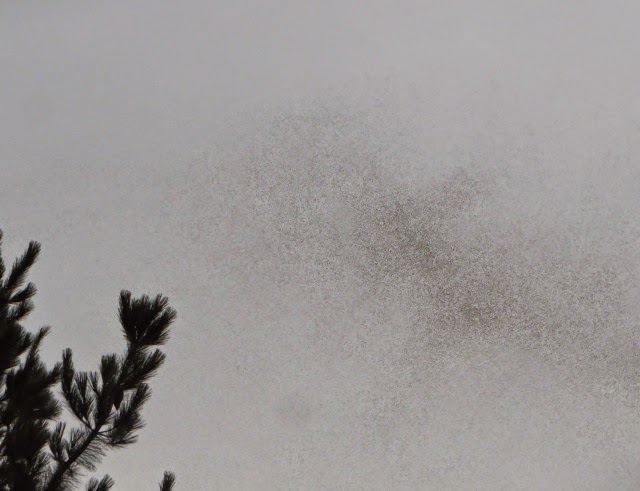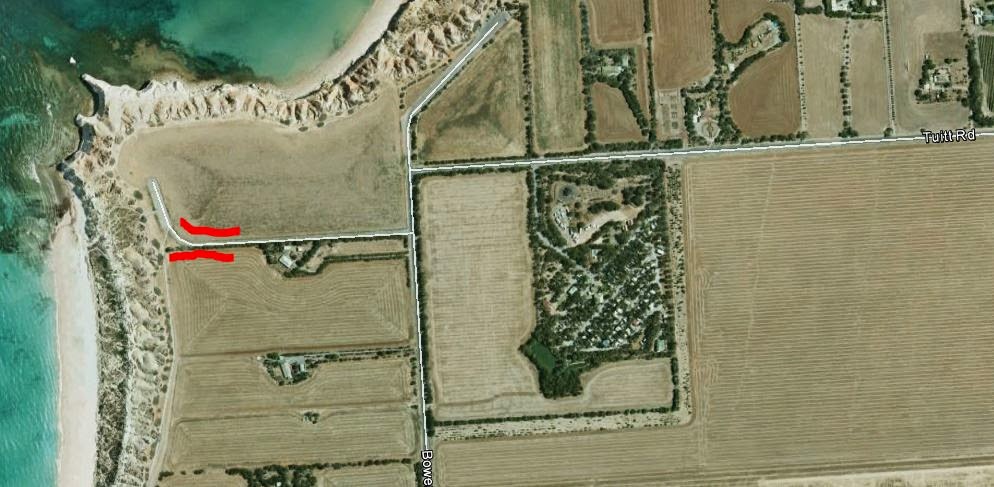Horticultural Archaeology and other rural activities
During the monsoon of last Summer part of our vegetable garden got seriously flooded. In part this was due to a drain pipe running across the garden bed having been punctured by injudicious forking about. So I decided to try to fix this situation.
Two options presented themselves:
The original position of the pipe is marked as a blue dashed line, with X marking the spot of the puncture.
One option was to simply cut out the punctured bit and replace it. The second option was to put in a new pipe where the red dotted line ran. I decided that the effort involved in the second option was likely to be huge, especially given the number of roots likely to be encountered going under the fruit trees so plan 1 was the go.
The ? indicates that I couldn't work out where it went after that without a large amount of effort. Possibly under this!
Oh poop!
After a little bit of ferreting around (where the mob from Time team when you need them?) I was able to expose pretty much the whole of the pipe.
By this stage I was beginning to wonder if option 2 would not have been little more work! So I measured the diameter of the pipe (10cm) and checked the length (3m) that needed to be replaced and took myself to Bunnings/ To my surprise they seemed to have 2 sizes of pipe close to 10cm: 100mm and 90mm. Of course I hadn't been anally retentive when measuring the diameter because
So I cut a small length off the old pipe - discovering a marking for 90mm in so doing - fitted the 3m length back into the car and took myself back to the store. A little later I was back and transformed this
into this.
It was then just a matter of filling in the trenches again. Surprisingly one never sees that stage of Time Team digs!
Earlier in the day I had taken advantage of a relatively high level of humidity, a very low level of wind; and the imminent start of the fire permit season to send up my second pile for the year. I was initially concerned the stuff was too green to ignite but fortunately the oily broom prunings fixed that. 40 minutes after ignition this is all that remained form a pile 1.8m high and about 5m long!
I will finish with a comment on linguistics. A few weeks ago I referred to Archaeopteryx (the avian fossil). I was subsequently advised that "Of course Archaeopteryx is ancient wing and not an English word." So Archaeology - study of old - as used in the title of this post is not an English word? How about Boomerang? Didgieridoo? Schlep? Mesa? Flamenco? Alkali? All can be found in the Concise Oxford Dictionary. I am reasonably sure bull**it is an English word!
Two options presented themselves:
The original position of the pipe is marked as a blue dashed line, with X marking the spot of the puncture.
One option was to simply cut out the punctured bit and replace it. The second option was to put in a new pipe where the red dotted line ran. I decided that the effort involved in the second option was likely to be huge, especially given the number of roots likely to be encountered going under the fruit trees so plan 1 was the go.
The ? indicates that I couldn't work out where it went after that without a large amount of effort. Possibly under this!
Oh poop!
After a little bit of ferreting around (where the mob from Time team when you need them?) I was able to expose pretty much the whole of the pipe.
By this stage I was beginning to wonder if option 2 would not have been little more work! So I measured the diameter of the pipe (10cm) and checked the length (3m) that needed to be replaced and took myself to Bunnings/ To my surprise they seemed to have 2 sizes of pipe close to 10cm: 100mm and 90mm. Of course I hadn't been anally retentive when measuring the diameter because
- I didn't expect them to have 2 sizes so close together, and
- it is difficult to measure a diameter when the rotten thing is still in the ground.
So I cut a small length off the old pipe - discovering a marking for 90mm in so doing - fitted the 3m length back into the car and took myself back to the store. A little later I was back and transformed this
into this.
It was then just a matter of filling in the trenches again. Surprisingly one never sees that stage of Time Team digs!
Earlier in the day I had taken advantage of a relatively high level of humidity, a very low level of wind; and the imminent start of the fire permit season to send up my second pile for the year. I was initially concerned the stuff was too green to ignite but fortunately the oily broom prunings fixed that. 40 minutes after ignition this is all that remained form a pile 1.8m high and about 5m long!
I will finish with a comment on linguistics. A few weeks ago I referred to Archaeopteryx (the avian fossil). I was subsequently advised that "Of course Archaeopteryx is ancient wing and not an English word." So Archaeology - study of old - as used in the title of this post is not an English word? How about Boomerang? Didgieridoo? Schlep? Mesa? Flamenco? Alkali? All can be found in the Concise Oxford Dictionary. I am reasonably sure bull**it is an English word!










Comments
Not giving up on your Greek being English, eh?
I am wrestling with Greco-Roman botanical terminology these days.(I hope you like that pun).
The damned botanists make a pig's ear of the language at the best of times.
My latest battls is with Oligochaetochilus gibbosus. I conclude that the eminent Polish Botanist Dariusz L. Szlachetko may be a master of Greek dictionaries, but he is not of poetic disposition, unfortunately.
.
Can you schlep your tongue around Oligochaetochilus, without it getting bent out of shape like a boomerang, or the word sounding like a badly played didgeridoo?
I can't.
But is Pterostylis any better? Another "winged" word.
Cheers
Denis
Kiswahili is a better language as the recently acquired words end in 'i'. Of course as that is a trade language all the words originated in other languages: it is just that some were acquired before an official version of the language was set down.